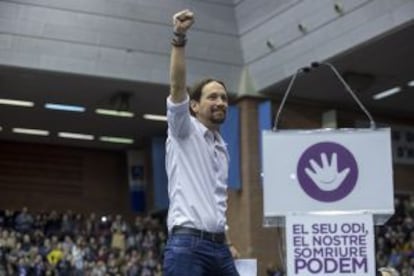What does Podemos want?
Writer John Carlin begins a two-part series exploring the phenomenal rise of the new party

It¡¯s noon on a Sunday four days before Christmas in Barcelona, and around 2,500 people are packed into a municipal leisure center in the Catalan capital¡¯s working-class Vall d¡¯Hebron district; a further thousand are gathered outside. They¡¯ve come to attend a rally organized by Podemos, the first major public event in Catalonia to be held by the political party set up a year ago by five university lecturers, whose most visible face is the group¡¯s leader, Pablo Iglesias.
The atmosphere is festive, and the crowd ¨C which includes people of all ages, from two to 80 ¨C is chanting the name of the man they believe has been called to show them the way out of Spain¡¯s ongoing economic and political crisis. There is a widespread sense that they are taking part in a historic moment.
There is still almost a year to go before Spaniards vote in general elections, but here in Vall d¡¯Hebron, the smell of victory is already in the air.?Podemos is topping the national polls, ahead of the opposition Socialist Party and with the ruling Popular Party trailing in third place.
There is still almost a year to go before Spaniards vote in general elections, but here the smell of victory is already in the air
Iglesias is dressed in a white shirt, blue jeans and trainers, a look that sets him apart from the rest of Spain¡¯s politicians. Podemos represents change, the future, modernity, although it has to be said that Iglesias¡¯s ponytail gives him the air of a 1970s rock singer. This incongruence is also reflected in Iglesias¡¯s words. He¡¯s a politics lecturer at Madrid¡¯s Complutense University, but the centerpiece of his speech is a story for children, a fable about cats and mice: the cats are the baddies, representatives of Spain¡¯s ruling caste, and the mice are the people, the goodies. His tone is urgent, and he spits his words out like bullets, telling the crowd that neither he nor the other founders of Podemos are Podemos: ¡°Podemos is you!¡± he says, but then adding: ¡°There are hundreds of thousands who say ¡®I¡¯m the guy with the ponytail.¡¯¡± He also says he isn¡¯t a left-winger, only to add: ¡°Power doesn¡¯t fear the left, only the people,¡± and concluding: ¡°I haven¡¯t come to Catalonia to promise anybody anything. I don¡¯t trust politicians who make promises.¡±
His audience in Vall d¡¯Hebron doesn¡¯t stop applauding and cheering throughout the speech, but it remains to be seen whether a majority of Spaniards are prepared to trust a political party that doesn¡¯t make promises. There are a lot of unanswered questions. What has Podemos done to convince so many people in so short a period? What sort of people are its leaders, its activists, the new converts to the cause? And above all, what does Podemos want?
At the party¡¯s headquarters in Madrid, 10 or so twentysomethings in jeans and T-shirts are working fervently on an ambitious mission: to conquer the hearts and minds of Spanish voters. They¡¯re armed with laptops and smartphones, the digital tools that Podemos has used to get its message out to the masses so effectively. Some would call it propaganda, but not 25-year-old Miguel Ardanuy, who heads what he calls the party¡¯s ¡°participation¡± campaign.

¡°Without the social networks, we wouldn¡¯t be where we are in the polls,¡± says Ardanuy, a former political sciences student at Madrid¡¯s Complutense University. ¡°In another age, you got your message over by knocking on doors; but today, everything happens in an instant.¡±
Around 300,000 people are signed up to Podemos¡¯s website, and policy is decided by participation in debate forums on the site, as well as on Twitter and a smartphone app called Appgree.
This has helped Podemos develop the core components of its ¡°narrative¡± and the key phrases that Ardanuy and other party members sprinkle into the conversation: ¡°We represent hope;¡± ¡°The PP and the Socialist Party are fossils;¡± ¡°Goodbye to the corrupt caste that governs us¡±? ¨C caste is perhaps the most-used word in Podemos¡¯s lexicon ¨C and the line they repeat over and over: ¡°We¡¯re neither left wing nor right wing.¡±
This ¡°common-sense¡± approach has garnered Podemos widespread support, and is the formula for creating what Pablo Iglesias calls ¡°a winning brand.¡±
Not all the rebels in the party are young. Jes¨²s Montero, the recently selected party secretary for Madrid, is 51 and holds a senior administrative position in the Complutense University. He started out in the Communist Party, helping found the United Left grouping in 1986, leaving it in 1997, and then heading to Chiapas, in Mexico, to work with Subcomandante Marcos¡¯s Zapatista revolution.
In 2003, believing that Spain¡¯s left was finished, he abandoned politics. But 11 years later, he¡¯s back. ¡°I have recovered my sense of hope. We¡¯re here to democratize and to put morals back into politics, to take the talk in the bars out into the main square, to re-establish the link between people and the government, which has treated us as though we were children.¡± He believes the time has come to end the paternalism exercised by Spain¡¯s two main parties. He admits he might once have called for an end to capitalism, but no longer.
¡°Not everybody in the business community is the same,¡± he says. ¡°There are people like the Bot¨ªn family who want to contribute to social wellbeing.¡± Asked if he¡¯s being serious, he says he¡¯s convinced that there are business leaders with good intentions. ¡°There are sections of the business community who understand they need countries with less social inequality so they can expand their markets. I¡¯m sure that Ana Bot¨ªn [president of Banco Santander] would have much to talk about with Pablo Iglesias, and would meet him.¡±
A few hours later, the message to the party¡¯s grassroots at a meeting led by Montero in the working-class Madrid neighborhood of Lavapi¨¦s was less measured, with participants chanting slogans such as: ¡°We¡¯re going to throw out the political and economic mafia, the sleaze merchants, and we¡¯re going to reclaim Madrid for its people,¡± and ¡°we¡¯re going to put an end to the austericide¡± and ¡°the old way of doing politics and we¡¯re going to create a participative democracy.¡±
When it was Montero¡¯s turn to speak, he told the audience that participative democracy was more possible today than ever, announcing that Podemos plans to launch a campaign to provide universal internet access, allowing everybody to have direct impact on its policies.
It¡¯s a nice idea, but a couple of questions come to mind. First, it assumes the majority of the population shares, or could end up sharing, the passion for politics shown by the sociologists and political scientists who created Podemos, when perhaps most Spaniards, like everybody else, see politics as a minority interest.
Second, it is based on the premise, fed by the constant virtual referendums that take place on the social networks, that the opinion of the people ought to be listened to. But as was seen in Germany in its day, the wisdom of the masses is a questionable concept, and often based on ignorance and mass hysteria. When it comes to complex and delicate issues such as the economy or foreign policy, the ideas that the tweeting masses bring to the main issues of the day are often about as useful as those the passengers of a plane might suggest to a pilot navigating a patch of turbulence.
Left and right are just metaphors, names, and are not eternal¡± Podemos number two I?igo Errej¨®n
But Podemos¡¯s leadership insists that most voters feel let down by the main political parties, and that a new approach to politics is required. ¡°Left and right are just metaphors, names, and are not eternal,¡±?says I?igo Errej¨®n, a founding member of Podemos, and also a lecturer at Madrid¡¯s Complutense University. ¡°We represent a common-sense approach contained in a transverse and popular identity, in opposition to the oligarchy.¡±
His spectacles give the already youthful looking 31-year-old a Harry Potter air; at the same time, he emanates supreme self-confidence, combined with an almost exhausting mental hyperactivity.
But the question that those opposed to the party keep asking is, just what is Podemos¡¯s program? To which Errej¨®n replies that the party is still in its infancy and that it is too early to demand too many details ¡°right now.¡±
What Podemos does have is what any party that hopes to win elections needs: a narrative with which all voters can identify. Iglesias and his team are presented to the collective imagination as the knights of the Round Table, who, along with an inflamed people, aims to attack, clear out, and occupy the black castle where the merciless caste are holed up. Errej¨®n accepts the metaphor, qualifying it only by saying that they ¡°still have a long way to go before reaching the walls.¡±
If they get to them, Errej¨®n says he doesn¡¯t underestimate the enormity of the challenge Podemos faces. He dreams, albeit with his eyes open. ¡°If we win the elections, that¡¯s when the party will really kick off. Then we¡¯ll be playing in the Champions League, and the revolutionary change we want, and we must recognize this, cannot be achieved unless Europe, or at least southern Europe, is with us. I¡¯m not arguing in favor of some utopia. We will push a little, but how hard depends on others in Europe as well.¡±

In other words, in a Europe where national sovereignty is limited, in a world that is more economically interdependent than ever, a government like Spain¡¯s could do little on its own, for example, to increase public spending or reduce unemployment. As Jos¨¦ M¨²jica, the outgoing president of Uruguay, and one of Podemos¡¯s idols, said recently: ¡°The problem is reality, because we don¡¯t do what we want, we do what we can within the margin of reality.¡±
What happens if Podemos disappears from the map as rapidly as it has appeared? Will it have served any purpose?
Errej¨®n is intelligent and he knows it, but he is also sufficiently humble not to dismiss the possibility. ¡°If we were to disappear tomorrow, we will have given the powerful a lesson. They will have been scared. By its existence alone Podemos has shown people¡¯s desire for democratic regeneration; it has revealed more clearly than ever the need for accountable government.¡±
Tu suscripci¨®n se est¨¢ usando en otro dispositivo
?Quieres a?adir otro usuario a tu suscripci¨®n?
Si contin¨²as leyendo en este dispositivo, no se podr¨¢ leer en el otro.
FlechaTu suscripci¨®n se est¨¢ usando en otro dispositivo y solo puedes acceder a EL PA?S desde un dispositivo a la vez.
Si quieres compartir tu cuenta, cambia tu suscripci¨®n a la modalidad Premium, as¨ª podr¨¢s a?adir otro usuario. Cada uno acceder¨¢ con su propia cuenta de email, lo que os permitir¨¢ personalizar vuestra experiencia en EL PA?S.
?Tienes una suscripci¨®n de empresa? Accede aqu¨ª para contratar m¨¢s cuentas.
En el caso de no saber qui¨¦n est¨¢ usando tu cuenta, te recomendamos cambiar tu contrase?a aqu¨ª.
Si decides continuar compartiendo tu cuenta, este mensaje se mostrar¨¢ en tu dispositivo y en el de la otra persona que est¨¢ usando tu cuenta de forma indefinida, afectando a tu experiencia de lectura. Puedes consultar aqu¨ª los t¨¦rminos y condiciones de la suscripci¨®n digital.









































